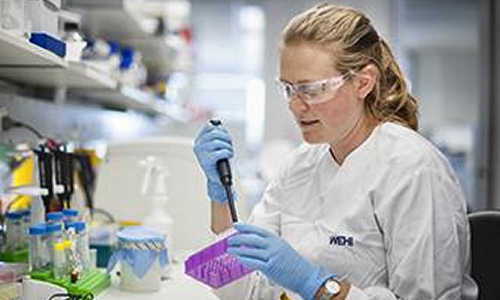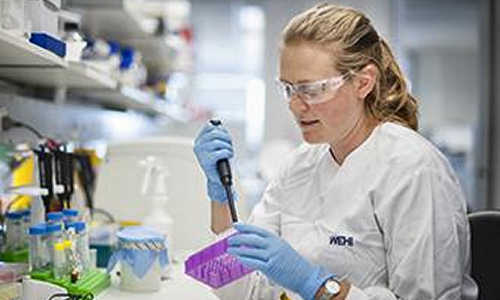A good immune system relies on a key ‘energy producing’ protein in immune cells to develop immunity to vaccines and disease, an international team of scientists has found.The protein, called HuR (human antigen R) is critical for controlling metabolism in B cells, which make antibodies that are essential in fighting infections and in developing long-term immunity after vaccination.
Dr Kirsten Fairfax, now at Melbourne’s Walter and Eliza Hall Institute, worked with Dr Manuel Diaz-Muñoz, Dr Martin Turner and colleagues at the Babraham Institute, Cambridge, UK, on the discovery, published in the journal Nature Immunology.
Dr Fairfax said the team showed removing HuR prevented the proper growth and function of B cells. “Immune cells called B cells mature in response to vaccines or exposure to new disease and are a key tenet of immunity,” she said. “HuR ‘manages’ a set of genes that determine how much energy B cells produce, known as the metabolic rate.
Dr. Kirsten Fairfax and colleagues at the Babraham Institute in Cambridge, UK, found a key protein regulates energy production in immune cells.
“We showed that without HuR to instruct them, these critical metabolic genes can no longer instruct the B cell to make the energy it needs to function, and B cells are unable to mature into antibody-producing cells that provide immunity to disease.”
This final stage of maturation requires a substantial amount of energy and occurs in a ‘B-cell factory’ called the germinal centre, Dr Fairfax said. “Germinal centres are the quality control check point for B cells,” she said. “B cells that pass the test mature and transform into antibody-producing (plasma) cells, while those that fail quality control start the maturation process again.
“If the immune cell’s metabolism isn’t functioning properly, maturation in the germinal centre stalls and plasma B cells cannot develop,” she said. This is potentially disastrous for the immune system as plasma B cells protect the body from infections and generate immunity after vaccination to prepare for future infections.”
Understanding the processes that control B cell development, including metabolism, can help scientists find ways to boost the efficacy of vaccines or preserve the body’s ability to develop immunity.
“As an example, some anti-cancer drugs that are used over extended treatment periods can impact cell metabolism,” Dr Fairfax said. “If these drugs impact on the metabolism of B cells, it may compromise a patient’s ability to create the new plasma B cells required to prevent infections. Identifying which drugs have this impact and monitoring patients receiving these drugs will help clinicians guide cancer patients through treatment while ensuring efforts to restore their immune system are effective.
Story Source:
The above story is based on materials provided by Walter and Eliza Hall Institute.






